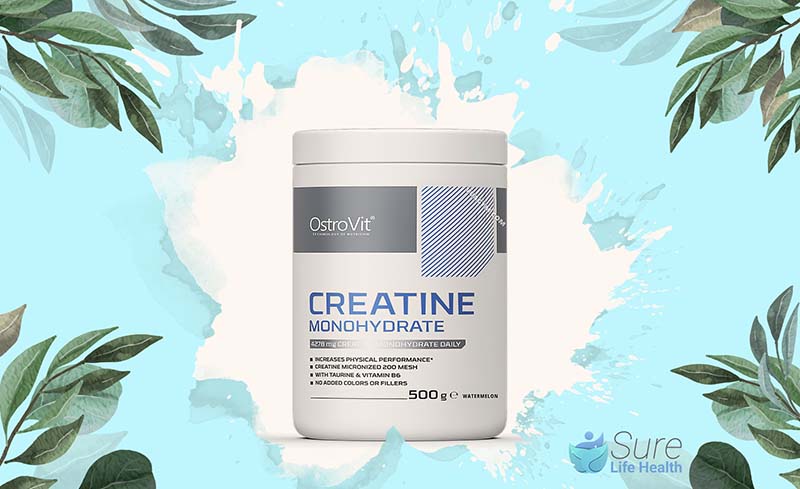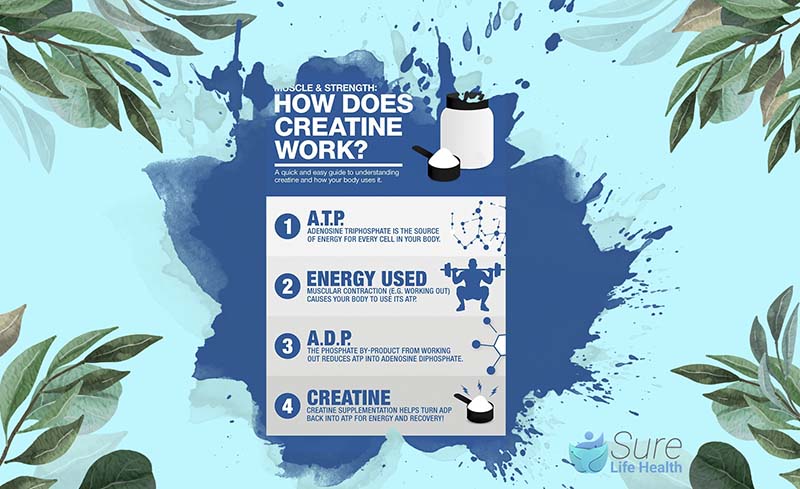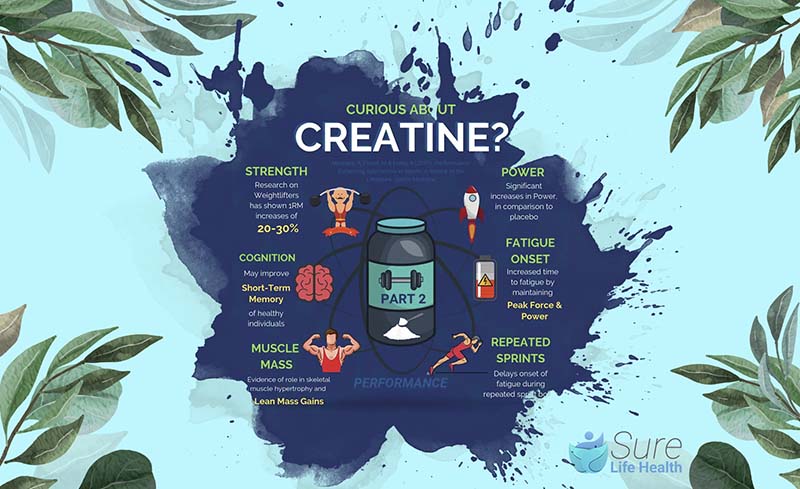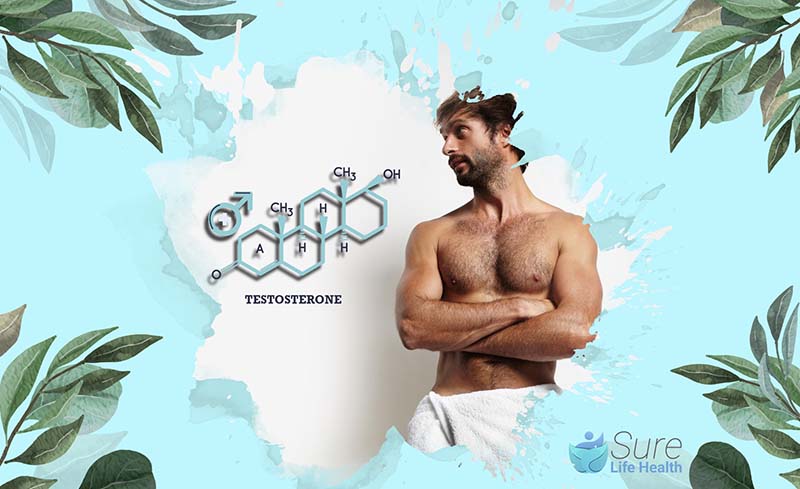Creatine is a big deal in the world of workout supplements, widely embraced for its muscle-building function. However, the popularity of its benefits extends far beyond the gym, including how it might affect the sexual health of male users.
In this article, we’re going to take a close look at how creatine works, especially in areas you might not expect.
Note: It’s important to keep in mind that how creatine affects one person might be different from another. Talking to a doctor before adding supplements like creatine to your routine is a smart move to make sure you get the benefits without unwanted side effects.
Does Creatine Cause Erectile Dysfunction?
Creatine monohydrate, a go-to supplement for many in the fitness and bodybuilding community, is well-regarded for boosting athletic performance and helping muscles grow.
But with so many discussions and debates about this supplement, a big question comes up: Could creatine monohydrate affect sexual health, especially when it comes to erectile dysfunction?
Turns out, this concern is more myth than reality. Research shows that creatine monohydrate does not cause erectile dysfunction. In fact, studies suggest it might even help with sexual health in an indirect way.
This information corrects some wrong ideas about creatine and points out that it could have more benefits than just improving workout performance.

Does Creatine Increase Sexual Desire?
The relationship between creatine supplements and sexual performance is attracting interest in the fitness and sports communities. While direct research linking creatine to enhanced sexual performance is scarce, there’s evidence suggesting an indirect influence.
Creatine’s primary benefit is muscle development and overall fitness improvement. Being stronger and more confident in one’s physique can positively affect sexual health.
Furthermore, creatine may contribute to hormonal regulation, including testosterone, which is crucial for sexual desire and performance.
This connection underscores the potential of creatine to support aspects of sexual health through its impact on physical wellbeing and hormonal balance.
How Does Creatine Work in the Body?
Your body produces creatine from three amino acids: glycine, arginine, and methionine. You can fill up to 80% of your creatine stores from eating protein-rich foods or by taking creatine monohydrate supplements. Once inside your body, creatine combines with a phosphate group to form creatine phosphate, which is stored in your muscles.
The key player in this process is adenosine triphosphate (ATP), the primary energy source for your body’s activities. When ATP is used for energy, it loses a phosphate to become ADP (adenosine diphosphate), which is less useful until it’s converted back into ATP.
Creatine phosphate contributes a phosphate to convert ADP back into ATP, providing your body with more energy to use.
Note: Understanding how creatine works helps you see why it’s such a favorite for boosting performance. By supporting your body’s energy-making process, creatine can help you get more from your workouts.

Other Benefits of Creatine for the Body
Helps with Parkinson’s Disease: Parkinson’s disease leads to decreased dopamine levels in the brain, causing symptoms like tremors, muscle function loss, and speech difficulties. Studies in mice have shown that creatine can prevent the significant drop in dopamine levels typically seen in Parkinson’s, but it’s not proven to have the same effect in humans. However, combining creatine with weight training has shown improved strength and daily function in those with Parkinson’s more than training alone. Yet, a review of studies found that taking 4–10 grams of creatine daily didn’t significantly enhance daily activity performance in Parkinson’s patients.
Speeds Muscle Growth: Creatine is hailed as the most effective supplement for muscle mass increase by The International Society of Sports Nutrition. Short-term use (5–7 days) can significantly boost lean body weight and muscle size, mainly through water retention in muscles initially. In the long term, it also helps muscle fiber growth by activating key biological pathways and improving gym performance. Studies show creatine users added more muscle mass compared to those who didn’t use it, even after periods of training and detraining.
Boosts Energy Production in Muscles: Creatine elevates your muscle’s phosphocreatine stores, which assist in creating ATP, the fundamental energy molecule for cellular functions and exercise. Since ATP is rapidly used during intense exercise, creatine supplementation can help you regenerate ATP quicker, enhancing your ability to maintain high-intensity performance levels. This energy-boosting capacity is one of the main reasons creatine is popular for enhancing exercise performance.
Note: While creatine shows promising benefits for muscle growth and energy production, its effectiveness can vary. It’s always wise to consider your personal health needs and consult with a healthcare provider before starting any new supplement, especially for conditions like Parkinson’s disease.

Creatine and Testosterone Levels
The relationship between creatine supplementation and testosterone levels has caught the attention of many researchers. There’s evidence to suggest that creatine might indeed have a beneficial effect on testosterone, which plays a critical role in sexual health, including erectile function and libido. The theory is that the muscle growth spurred by creatine intake could naturally lead to higher testosterone levels in the body. As muscles get bigger and stronger from creatine use, the body responds by ramping up testosterone production. This increase in testosterone is often linked to enhancements in sexual performance and desire.
Note: While the potential for creatine to boost testosterone is exciting, it’s important to approach supplementation with a balanced perspective. Not everyone will experience the same changes, and factors like diet, exercise, and overall health play significant roles in how supplements like creatine affect you. For personalized advice and to ensure your supplement use is safe and effective, consulting with a healthcare professional is always a smart choice.

Is It Safe to Take Creatine and Testosterone Boosters at the Same Time?
Mixing creatine with testosterone boosters is generally considered safe and can be quite beneficial. Creatine is a powerhouse for improving physical performance and bulking up muscles, while testosterone boosters aim to elevate your testosterone levels.
When used together, they can lead to gains in muscle mass, strength, energy, and better overall exercise performance. Creatine has also been seen to have an indirect effect on testosterone by increasing levels of DHT (dihydrotestosterone), which is a potent derivative of testosterone.
Research supports that using creatine alongside testosterone replacement therapy (TRT) can boost the effectiveness of androgens.
Conclusion
Creatine is widely recognized for its ability to enhance energy production, yielding significant gains in strength and muscle development. However, its benefits are not limited to physical training. By boosting energy production, creatine aids in a variety of bodily functions, leading to improvements in cognitive performance, productivity, and hormone regulation.
This improved hormone regulation is particularly valuable for men experiencing decreased testosterone due to aging or specific health issues. By potentially raising testosterone levels, creatine supplementation can enhance sexual desire and address more significant concerns, such as erectile dysfunction.
Moreover, opting for a creatine supplement is often a more cost-effective and simpler approach compared to other testosterone-boosting methods, such as patches or injections
Be sure to explore more insightful blogs from Sure Life Health, where we continue to shed light on the latest trends and breakthroughs in health and wellness.
Professor Gaye Cunnane, PhD, MB, FRCPI
As the Director of Health and Wellbeing at RCPI, Professor Gaye Cunnane is at the helm of initiatives aimed at enhancing the health and well-being of RCPI Trainers and Trainees. Her role extends beyond administration; she is also a respected clinical professor of rheumatology and a consultant rheumatologist at Trinity College Dublin (TCD) and St James’s Hospital. Prof. Cunnane’s medical journey began at TCD, where she graduated from medical school, and her path has been marked by both clinical and academic excellence.
After completing her basic clinical training in medicine, she embarked on PhD studies at University College Dublin and St Vincent’s University Hospital. Her research during this period was focused on prognostic markers in early inflammatory arthritis, a project that saw her collaborating with esteemed universities across Europe, including in Switzerland, The Netherlands, the UK, and Sweden.
Prof. Cunnane’s career took her to the University of California, San Francisco, where she spent three years delving into research on new treatments for lupus. Her academic prowess led her to the University of Leeds in 2001 as a senior lecturer, before returning to Ireland in 2003 to assume her current roles. She has also served as the National Specialty Director for Rheumatology training in Ireland, Programme Director for Basic Specialist Training with RCPI, and as a past President of the Irish Society for Rheumatology.
PUBLISHED ARTICLES
“Rheumatic disease differentiation using immunoglobulin G sugar printing by high-density electrophoresis”: Published in The Journal of Rheumatology, this study reflects her in-depth investigation into rheumatic diseases.
“Benefits of exercise in patients with rheumatoid arthritis: a randomized controlled trial”: This research work, highlighting the positive impact of exercise on rheumatoid arthritis, underscores Prof. Cunnane’s dedication to practical, patient-centered research.
Additionally, Prof. Cunnane has made notable contributions to the Annals of the Rheumatic Diseases, discussing early referral, diagnosis, and treatment of rheumatoid arthritis. She has also been involved in a study on the NCBI platform investigating exercise benefits in rheumatoid arthritis patients.
Professor Gaye Cunnane’s career is a testament to her commitment to improving patient outcomes in rheumatology through rigorous research, clinical excellence, and dedicated teaching. Her work continues to influence the field of rheumatology, both in Ireland and internationally.

